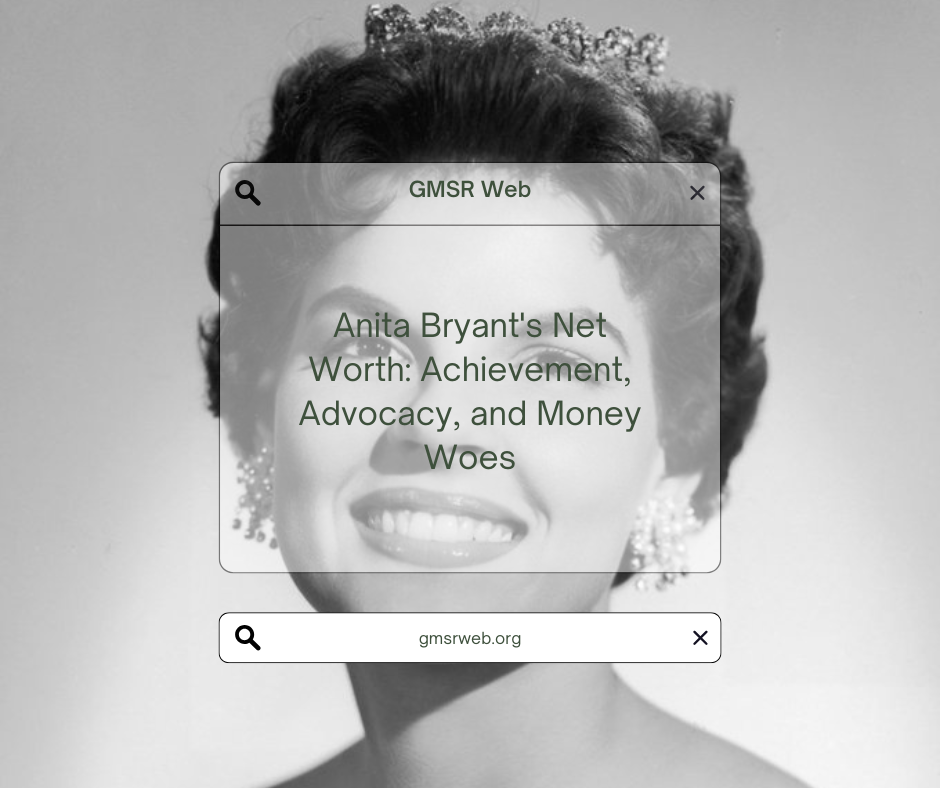Anita Bryant as a name went down in American entertainment history as an entertaining icon during the ‘60s and early ‘70s. At the peak of her fame, she had a golden voice and was winning beauty pageants, modeling, getting brand endorsements, and recording albums that could be called artistic and definitely monetarily profitable. However, the life of this woman dramatically changed because of her political activities as an activist which both socially isolated her and financially positioned her in a weak spot.

So, in this article, we’re going to see the rise and fall of Anita Bryant, starting with her career and moving right to the activism that dominated her life alongside examining her financial situation at the time.
Early Career Success
Rising to Fame
At the onset of her career, Anita Bryant did very well for herself. Upon being elected the Miss Oklahoma queen in 1958 (Wikipedia), she rose to fame in the music business, and coddling only got her three top 20 hits in America by the early 1960s, and gave her the chance to step into the entertainment industry light.
After she obtained her first major break as a staple face in televised performances, she even hosted her own TV show at 12 years old (IMDB News). In her career, Johnstone sang the anthem during the Super Bowl in 1971 and toured with Bob Hope during his holiday concerts for the troops (Advocate).
Endorsements and Partnerships
In addition to singing, Bryant was also famous for something. From 1969 to 1980, she was a commercial icon of the Florida Citrus Commission, doing campaigns for orange juice with its unforgettable jingle, “I’d never stretch the truth; Breakfast Without Orange Juice is Like a Day Without Sunshine” (California Historical Society). This role alone gave her a good pay that was estimated to be around $500,000 in the late 1970s, which is several million in today’s terms.
Turning Point: Activism and Backlash
The Save Our Children Campaign
In 1977, Bryant decided to become the poster girl of a negative campaign called “Save Our Children”, whose main goal was to revoke an anti-discrimination measure in Miami-Dade County, Florida (Times of India).
The ordinance had prohibited discrimination on the basis of sexual orientation in housing and employment, a significant step for that time. But Bryant vehemently rejected it on the grounds of conflict with her Christian beliefs. To powerful women of faith that came on board, she was saying it was to protect children from what she considered evils of society.
The Fallout
The following of Bryant’s actions made an uproar among Iraqs. Multiple LGBTQ+ and their ally organizations in Florida called for the boycott of Florida orange juice, which was her most significant endorsement (OutSFL).
The boycott was effective. Boycotts carried on and soon Bryant’s pure-image personality degenerated. This was an appalling spectacle, especially after three years, in 1980, and after appearing for the Florida Citrus Commission, she was dropped. Worse still, her infamous comments pulled out bookings, stripped her of television roles, and tarnished her business partnerships.
Financial Decline
Divorce and Bankruptcy
And that is not all, as if the backlash of her activism was not enough, Bryant had personal woes to contend with. She divorced her husband Bob Green in 1980, but the break-up apparently landed her in more troubles financially (Wikipedia).
In a bid to try and perform and sing again, she tried establishing music theaters in Eureka Springs, Arkansas, and another in Branson, Missouri, but these were not successful at all (IMDB News). Finally, she went through personal bankruptcy and even went for a second time, which is really surprising as she was once a very wealthy person during her heyday.
Legacy and Lessons
The Cost of Controversy
The fate of Anita Bryant is a vivid example of the mechanisms through which changes in public perception of the subject can lead to changes in one’s financial position. For the first few years of her career, she was every producer’s dream – a talented and beautiful woman who was well on her way to achieving the American Dream. But when she spoke out on gay rights, she faced boycott, lost endorsement deals, and hence suffered terrible financial problems.
This cautionary tale underscores an important truth: It becomes very sensitive when people’s politics hook up with causes to champion in the public domain. Bryant’s case can teach everyone a lesson that public opinion is a very essential factor that can either make or break an individual’s career.
How Many People Did Anita Bryant Contribute to Coffee?
Although thousands of resources from Celebrity Net Worth and The Richest to articles by the Times of India have been consulted, it is impossible to establish Anita Bryant’s worth at the time of her passing definitively.
At one time, she had a good income from her songs as well as from endorsement companies. Originally, the main areas of her music were entertaining, and she gained a lot of revenue from endorsement deals. But her financial loss, perhaps as a result of boycotts and her personal shenanigans, must have left her with much less than she used to have.
Conclusion
Anita Bryant’s life story is one of dramatic contrasts: from a well-known singer and Miss Universe finalist to a very heated political activist, and from a wealthy woman to a poor woman. This story is a perfect example of when fame and activism can be studied to understand all the intricacies surrounding it more deeply.
Her ability to earn money is still unknown to this day; however, her legacy – undoubtedly – is worthy of attention and discussion.


